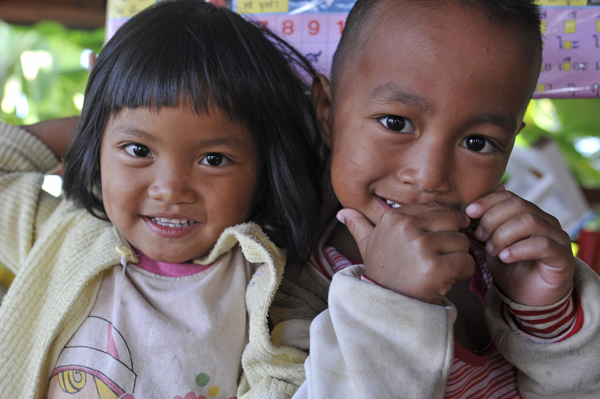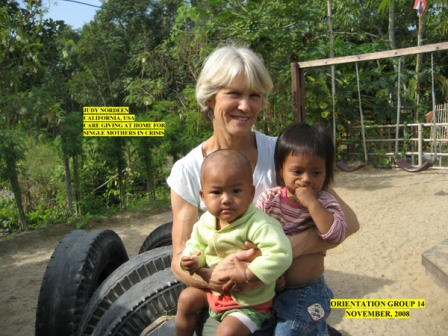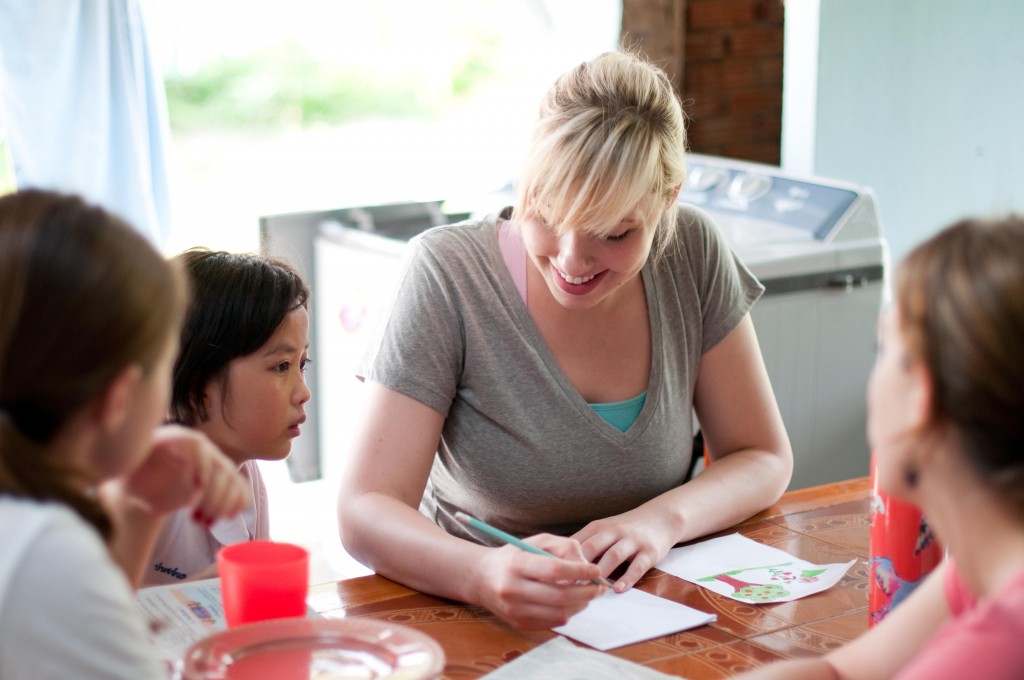Happy Mother’s Day from Friends for Asia!
It’s almost Mother’s Day in Thailand, and many people (including a few of our staff at FFA) are preparing to travel home and pay respect to their mothers. As motherhood is one of the most-respected roles in Thai society, this is a particularly important observance for Thai people. In the West, Mother’s Day typically falls on a Sunday, and the actual dates change from one year to the next. But in Thailand, the day always falls on August 12. That’s because it has been timed to coincide with the birthday of HM Queen Sirikit. This is an auspicious occasion in Thailand, and it sets the stage for an entire nation to pause and pay respect to those women who have made life possible and cared for them.
In Thailand, Mother’s Day is a public holiday, so Thai people usually have the day off from work. But they don’t necessarily have a guaranteed weekend with which to celebrate – as we would in the West. This can make it difficult for those living in other provinces to make it home to spend time with their mothers.
But this year, Mother’s Day falls on a Friday. That means many people have an extra-long weekend and plenty of time to visit with their families. There are sure to be many family gatherings and celebrations this weekend. With that in mind, we thought we’d take a moment to share some information about this special day with you.
In the West, Mother’s Day typically falls on a Sunday, and the actual dates change from one year to the next. But in Thailand, the day always falls on August 12. That’s because it has been timed to coincide with the birthday of HM Queen Sirikit. This is an auspicious occasion in Thailand, and it sets the stage for an entire nation to pause and pay respect to those women who have made life possible and cared for them.
In Thailand, Mother’s Day is a public holiday, so Thai people usually have the day off from work. But they don’t necessarily have a guaranteed weekend with which to celebrate – as we would in the West. This can make it difficult for those living in other provinces to make it home to spend time with their mothers.
But this year, Mother’s Day falls on a Friday. That means many people have an extra-long weekend and plenty of time to visit with their families. There are sure to be many family gatherings and celebrations this weekend. With that in mind, we thought we’d take a moment to share some information about this special day with you.
History of Mother’s Day in Thailand
When Mother’s Day was first introduced as a national holiday, Her Majesty Queen Sirikit was not yet the Queen of Thailand. But it didn’t take long for the Thai people to recognize just how important of a role their soon-to-be queen would play in the development of their nation. The first Mother’s Day in Thailand was celebrated on April 15, 1950. And for a quarter of a century, this was when Thai people celebrated Mother’s Day. This placed it immediately after Songkran, at a time when families were already together to celebrate the Thai New Year. In that sense, this was also a great opportunity for people in Thailand to make merit and honor their mothers.
It’s also worth noting that the first Mother’s Day in Thailand took place just two weeks before HM King Bhumibol and HM Queen Sirikit were married. No sooner had Thailand established a day of observance for us to honor our mothers than a new maternal figure had emerged. But for the time being, Thai people would continue to observe Mother’s Day on April 15.
Then in 1976, the day was moved to August 12 to commemorate the Queen’s 44th birthday. At this point, the Royal Family was just that – a family, with grown children of their own. Queen Sirikit had also cemented her role as a leader and maternal figure for an entire nation.
Establishing the Queen’s birthday as Mother’s Day was a thoughtful way to both recognize the important work she has done for Thailand while elevating and honoring the role that each of our mother’s play in our families.
The first Mother’s Day in Thailand was celebrated on April 15, 1950. And for a quarter of a century, this was when Thai people celebrated Mother’s Day. This placed it immediately after Songkran, at a time when families were already together to celebrate the Thai New Year. In that sense, this was also a great opportunity for people in Thailand to make merit and honor their mothers.
It’s also worth noting that the first Mother’s Day in Thailand took place just two weeks before HM King Bhumibol and HM Queen Sirikit were married. No sooner had Thailand established a day of observance for us to honor our mothers than a new maternal figure had emerged. But for the time being, Thai people would continue to observe Mother’s Day on April 15.
Then in 1976, the day was moved to August 12 to commemorate the Queen’s 44th birthday. At this point, the Royal Family was just that – a family, with grown children of their own. Queen Sirikit had also cemented her role as a leader and maternal figure for an entire nation.
Establishing the Queen’s birthday as Mother’s Day was a thoughtful way to both recognize the important work she has done for Thailand while elevating and honoring the role that each of our mother’s play in our families.
HRM Queen Sirikit: Mother of a Kingdom
It’s certainly no exaggeration to say that Queen Sirikit has been a mother figure for people in Thailand. Over the years, she has proved again and again that she wants nothing more than for Thai people to prosper and live in harmony with one another. In 1956, she became President of the Thai Red Cross Society. This humanitarian organization provides a wide range of services for the country. Beyond the Red Cross’ well-known role in collecting blood donations and making them available when needed, it is also involved in the following activities: • Organizing organ donations • Providing medical and rehabilitation services for long-term patients • Educating and training nurses in Thailand • Producing vaccines and snake antivenin for national distribution • Providing HIV testing as well as counseling services for those suffering from HIV and AIDS • Caring for orphans and abandoned children As President of the Red Cross, she has overseen some of the most import public health initiatives ever undertaken in Thailand. The programs she has administered have helped to nurture neglected children, to provide care for the injured and ill, and to raise up generations of new caregivers to continue the good work. And this is only one of many ways that she has fulfilled this duty. She also served as regent when King Bhumibol entered the monkhood for a time. In years since, she has donated her own funds to help people in need. For example, she has supported the treatment of people infected by the chikungunya virus; personally provided aid for patients in intensive care; and sent food, blankets and clothing to victims of disastrous floods in 2008 and 2009. Queen Sirikit truly is a mother to a nation.
And this is only one of many ways that she has fulfilled this duty. She also served as regent when King Bhumibol entered the monkhood for a time. In years since, she has donated her own funds to help people in need. For example, she has supported the treatment of people infected by the chikungunya virus; personally provided aid for patients in intensive care; and sent food, blankets and clothing to victims of disastrous floods in 2008 and 2009. Queen Sirikit truly is a mother to a nation.
How Thai People Celebrate Mother’s Day
Like many Thai holidays and observances, there is a special way to commemorate Mother’s Day. Many make an effort to go home and spend time with their family on this special day. When greeting their mother, they’ll take a moment to kneel before her and prostrate themselves. This is known as a grap in Thai language, and it’s reserved for expressions of great respect. Prostrating yourself before your mother is a symbolic way of showing her how deeply you respect and honor her. At this time, Thai people will also give their mother a garland of fragrant jasmine. At this point, the mother will bestow a blessing upon her child. It’s a brief but moving gesture that shows just how profound the mother-child relationship is – even after the child becomes an adult. It’s also common for the entire family to make merit together. This often occurs early in the morning when monks are making their daily rounds. However, Mother’s Day could just as easily include a trip to the local temple for more merit-making. Finally, it’s also common for families to make a charitable donation to a worthy cause on Mother’s Day. They might visit a local orphanage or children’s home to make a contribution. This is a way of passing on the love and care they have received from their mothers to those who are less fortunate.





